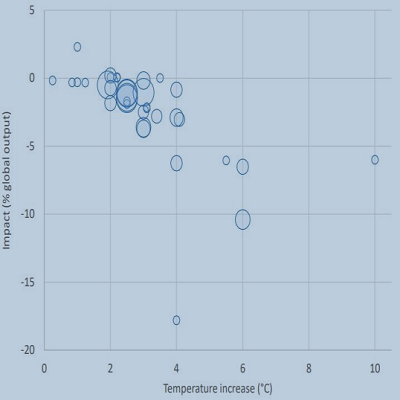William Nordhaus was awarded the “Nobel Prize” for economics in 2018 for his work on climate change economics.
This graph is the latest iteration of the climate damage function that Nordhaus and his colleagues developed to estimate the impact of climate change on economic activity. This seemingly benign chart could decide the fate of humanity. An earlier variation of it was used in the most recent IPCC report.
In his acceptance lecture Nordhaus advocated for climate action and concluded that the optimum economic balance of abatement versus damages costs is at a temperature rise of 4 degrees Celsius.
Let’s look at the graph again for a second. Based on the best fit of the points on the graph, Nordhaus estimated a reduction in global GDP (gross domestic product, or economic activity) of around 4% for an average global temperature rise of 4 degrees. A 4% reduction in GDP doesn’t sound like much, especially when spread over many years. So are we overly worried?
Professor Steve Keen, for one, has questioned the assumptions underlying the graph. According to Keen, Nordhaus has not taken account of the higher global energy content of the planet in a hotter environment, not to mention the risks of triggering climate tipping points. He believes the graph way underestimates the damage.
He illustrates his point by noting that the data which underpins the graph makes the plot symmetrical, which means GDP declines at the same rate with falling temperatures. Keen points out that 20,000 years ago the world’s temperature was around 4 degrees lower than today. At that time Canada and northern Europe were covered by Ice Sheets. Would that scenario correlate with only a 4% reduction in global GDP?
Prize winning work carries a lot of clout. A lot of young people today don’t believe it – maybe with good reason.
SEPTEMBER 2020 UPDATE: Professor Keen has published a full critique of Nordhaus work, The appallingly bad neoclassical economics of climate change in the Journal Globalizations.
Graph Credit: Nordhaus and Moffat, 2017 A Survey of Global Impacts of Climate Change: Replication, Survey Methods, and a Statistical Analysis.
